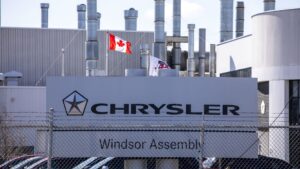Stellantis Takes Action Amidst New Tariffs: What It Means for the Automotive Industry
In a hit that has reverberated throughout the automotive industry, Stellantis has announced a pause in production at two of its key assembly plants—one in Windsor, Canada, and another in Toluca, Mexico. This significant move comes in direct response to a new round of automotive tariffs imposed by President Donald Trump, which places a steep 25% tariff on all vehicles imported to the U.S., including those manufactured in Canada and Mexico. As of now, these tariffs are officially in effect, prompting immediate reactions from major players in the sector.
What’s Happening at Stellantis?
The next two weeks will see a complete halt in operations at the Windsor Assembly Plant, which notably produces the Chrysler Pacifica minivan and the recently launched Dodge Charger Daytona EV. At the same time, Stellantis plans to shut down production at its Toluca plant throughout the entirety of April, which is responsible for manufacturing popular models such as the Jeep Compass SUV and the Jeep Wagoneer S EV.
This pause in production is not just a matter of temporary inconvenience; it also means the temporary layoffs of around 900 employees in U.S. plants that support these operations, along with approximately 4,500 hourly workers at the Canadian facility. While employees at the Toluca plant will continue reporting to work, they will not be engaging in vehicle production due to contractual obligations.
Insights from Stellantis Leadership
In a message sent to employees, Antonio Filosa, Stellantis’ North American chief, noted that they are taking these immediate actions while the company evaluates the medium- and long-term impacts of the new tariffs. Filosa emphasized that "the current environment creates uncertainty," which has prompted the automaker to reassess its operational strategies.
“Our commitment extends beyond just surviving these turbulent waters,” he reassured staff. “We are actively engaging with key stakeholders—government officials, unions, suppliers, and dealers—across the U.S., Canada, and Mexico.”
The Broader Implications for the Automotive Sector
While Stellantis is the first automaker to take such drastic measures in light of the new tariffs, it is unlikely to be the last. The automotive industry is currently grappling with a myriad of challenges, from supply chain disruptions to rising prices and shifting consumer preferences toward electric vehicles (EVs). Companies across the sector will be watching Stellantis closely to understand the implications and potential strategies before they, too, may be forced to pause production or make other significant changes.
At Extreme Investor Network, we understand how vital it is for investors and stakeholders to remain informed about these developments. The automotive landscape is evolving quickly, and decisions made now will shape the entire industry’s future for years to come. Diversifying investments, staying attuned to policy changes, and understanding the critical turning points in production will greatly benefit savvy investors.
Conclusion
As Stellantis navigates these challenges, the broader markets will need to adapt to the new reality of automotive tariffs and their implications for production. This scenario highlights the crucial role that geopolitical policies play in business operations and can serve as a catalyst for deeper discussions on future investments in the automotive sector.
Stay informed with Extreme Investor Network for insights into the evolving business landscape and how these changes could affect your investment strategy. We bring you the latest trends, expert analyses, and valuable resources that empower you to make informed decisions in a rapidly changing environment.

